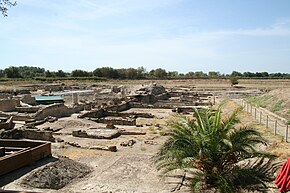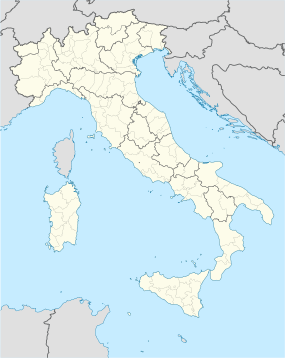Thurii
| Θούριοι | |

Overview of excavated ruins, possibly from Thurii
|
|
| Alternate name | Thurium, Copia, Copiae |
|---|---|
| Location | Sibari, Province of Cosenza, Calabria, Italy |
| Region | Bruttium |
| Coordinates | 39°43′2″N 16°29′44″E / 39.71722°N 16.49556°ECoordinates: 39°43′2″N 16°29′44″E / 39.71722°N 16.49556°E |
| Type | Settlement |
| Site notes | |
| Website | ArcheoCalabriaVirtual (Italian) |
Thurii (/ˈθʊərɪaɪ/; Greek: Θούριοι Thoúrioi), called also by some Latin writers Thurium (compare Greek: Θούριον in Ptolemy), for a time also Copia and Copiae, was a city of Magna Graecia, situated on the Tarentine gulf, within a short distance of the site of Sybaris, whose place it may be considered as having taken. The ruins of the city can be found in the Sybaris archaeological park near Sibari in the Province of Cosenza, Calabria, Italy.
Thurii was one of the latest of all the Greek colonies in this part of Italy, not having been founded until nearly 70 years after the fall of Sybaris. The site of that city had remained desolate for a period of 58 years after its destruction by the Crotoniats; when at length, in 452 BC, a number of the Sybarite exiles and their descendants made an attempt to establish themselves again on the spot, under the guidance of some leaders of Thessalian origin; and the new colony rose so rapidly to prosperity that it excited the jealousy of the Crotoniats, who, in consequence, expelled the new settlers a little more than 5 years after the establishment of the colony. The fugitive Sybarites first appealed for support to Sparta, but without success: their application to the Athenians was more successful, and that people determined to send out a fresh colony, at the same time that they reinstated the settlers who had been lately expelled from thence. A body of Athenian colonists was accordingly sent out by Pericles, under the command of Lampon and Xenocritus. Pericles' expressed intent was for it to be a Panhellenic colony, and the number of Athenian citizens was small, the greater part of those who took part in the colony being collected from various parts of Greece. Among them were two celebrated names – Herodotus the historian, and the orator Lysias, both of whom appear to have formed part of the original colony. The laws of the new colony were established by the sophist Protagoras at the request of Pericles, adopting the laws of Zaleucus of Locri.
...
Wikipedia

